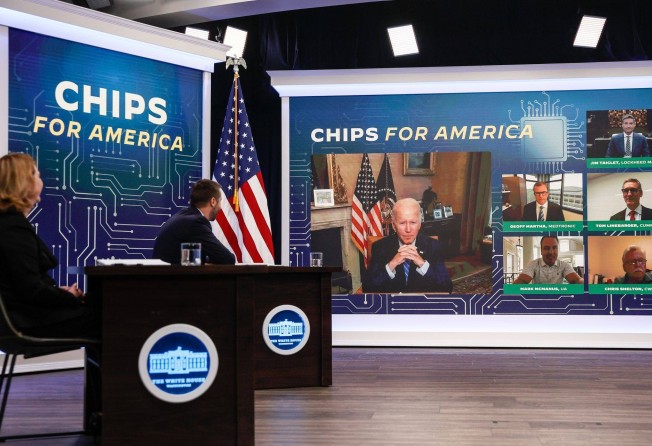
US rivalry with China and Russia is elevating the global role of Africa and the Middle East
- Washington’s attempts to isolate Moscow and contain Beijing have not only pushed the two together, but prompted them to seek new partners outside US influence
- Trade and investment deals in the Middle East and Africa could see these regions become increasingly key players on the world stage

The collapse of Russia-US ties and continued deterioration of the China-US relationship have not only fostered closer cooperation between Moscow and Beijing, but also galvanised their geopolitical overtures to other global poles such as the Middle East and Africa.
These attempts by China and Russia to secure strategic partnerships with actors outside US-dominated areas provide insight into what the future global environment may look like.
When the current global security crisis is over, the new world order is likely to be more fragmented, redistributed between several poles and powers, and hence less stable.
Russian President Vladimir Putin and China’s President Xi Jinping have repeatedly hailed the “no-limits” partnership between their respective countries, to the displeasure of the US. As I argued for the European Financial Review in October, “Russia-China relations … are driven by a common desire to overturn the US-led global domination and establish a new world order”.
China is being put under increasing pressure by American attempts to restrict it regionally and internationally. Though US President Joe Biden promised to avoid a “new Cold War” with China ahead of his meeting with Xi in Bali in November, Washington has kept up its tough stance on Beijing.
In August, China blasted Washington’s passing of the Chips and Science Act and the Inflation Reduction Act, both of which damage the country’s interests. In October, the US enacted a sweeping set of bans on hi-tech exports to China, with Japan and the Netherlands reportedly planning to follow suit.

As China’s domestic production accounts for only 15 per cent of the global semiconductor output, such coordinated restrictions are tantamount to a near-total blockade and could have a grave impact on Chinese hi-tech development. In response, Beijing has filed a suit against the US at the World Trade Organization, while urging other states to resist the US’ “unilateral bullying”.
Washington may have a point in fearing that an increasingly proactive Moscow-Beijing tandem could harm its global leadership. The recent G20 and Apec meetings, as well as several UN votes, have showcased an absence of unity about the ongoing global security crisis and major power rivalry.
Meanwhile, the Shanghai Cooperation Organisation was hailed as an “alternative to the West” during the September summit in Samarkand, with Iran admitted as a permanent member and even Nato ally Turkey expressing interest in the group. Russian Foreign Minister Sergey Lavrov also said in November that several states are seeking formal participation in the BRICS group, with Algeria, Argentina and Iran having already applied.
Russia and China are strengthening partnerships not just bilaterally but by actively reaching out to regions like the Middle East. Xi has just returned from his first trip to the region since 2016. His visit to Saudi Arabia was hailed as an “unprecedented” elevation of relations, with cooperation extending beyond trade and energy to technology, security and mega-infrastructure projects.
Overall, Beijing and Riyadh signed 34 energy and investment deals worth US$29.26 billion. China also secured support from leaders at the first China-Arab States Summit for the one-China principle.
In addition, Beijing held its first summit with the six members of the Gulf Cooperation Council (GCC), for whom China is the largest trading partner and export market for petrochemical products. As part of its de-dollarisation efforts, China is looking to expand the use of the yuan in oil and gas trade with GCC states. It has already surpassed the US dollar as the most traded foreign currency at the Moscow exchange.
Russia has similarly strengthened what some call its “relationship of convenience” with Iran. Moscow and Tehran have developed strong military cooperation which, according to a Washington Post estimate, is becoming “a full-scale defence partnership”.
Specifically, Russia and China seek to strengthen defence cooperation with Arab states. Moscow and Tehran are reportedly providing one another with an unprecedented level of military and technical support, while Xi in his speech at the Gulf summit pledged China’s support for creating a “collective security framework” in the region. Additionally, the Saudis were recently reported to have bought US$4 billion worth of weapons from China.
This intensified competition between major powers for the attention of the Arab world points to the region’s growing role in global affairs. Most recently, it was the United Arab Emirates that mediated a prisoner swap between the US and Russia.
Moscow and Beijing have also focused on improving ties with Africa. Russia is currently preparing to host the second Russia-Africa Summit in St. Petersburg next year. China remains Africa’s largest trade and investment partner and, during the Forum on China-Africa Cooperation in November, the value of imports from Africa to China was pledged to hit US$300 billion by 2025.
Following a number of setbacks in Washington’s own Middle East policy – its withdrawal from Afghanistan, and its deteriorating ties with some of its regional partners – it has turned its attention to Africa, where it is now playing catch-up with Moscow and Beijing. At the first US-Africa summit since 2014, Biden stressed that the US “is all in on Africa”, and will provide US$55 billion in investments in the next three years.
So, the geopolitical turbulence of late – accelerated by Russia-US and China-US antagonism – has not only shattered the global order which has existed since the end of the Cold War, but also redesigned partnerships in which the roles of the Arab world and Africa are becoming more prominent.
Danil Bochkov is an expert at the Russian International Affairs Council
